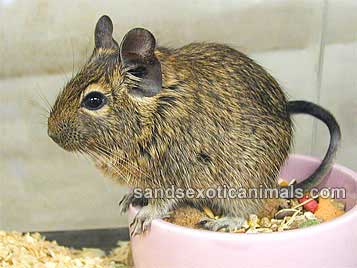
Origin:
Found in the lowland areas of Chile in South America.Description:
A degu is a small rodent that is closely related to the guinea pig and chinchilla. Degus are very social, inquisitive animals and can be very vocal. The overall size for a degu is 5 to 7 inches. Degus may live up to 7 years in captivity.Feeding:
A good diet consists of a combination of hay and pellets (guinea pig, rabbit or commercial rodent block). Alfalfa cubes can be used instead of hay. Corn, carrots or sweet potatoes are other favorite foods which can be fed occasionally. Sunflower seed and raw peanuts can be offered as a treat. Whole nuts in the shell can be offered as a treat and the gnawing through the hard shell on the nut is very good for their teeth. Raisins are another favorite treat. Small amounts of fresh grass can be given them and whatever they don't eat, the degus will use for bedding. Do not overfeed or give too many treats. Fruit should rarely be offered as it may lead to diarrhea or even diabetes.Housing:
Degus should be housed in a wire cage and not an aquarium. A wire cage allows them to climb and provides better air circulation. They are very active animals and need lots of space. PVC pipe or clay pots can be used as a hide box or nest box for them. Branches, bird perches, untreated blocks of wood, cardboard tubes or brown paper bags can be used for playthings. Just make sure that any items used for playthings are harmless. Degus will drink from a water bottle. The floor of the cage should have a deep bed of shavings in which they can hide, nest and eat. Degus are very clean animals and have very little natural odor. Degus may use a dry bath in which a shoebox filled with about one inch of chinchilla dust is offered to them.Gnawing:
The teeth of a degu grow constantly. If their diet is too soft and you do not give them anyhing to wear the enamel down, their teeth will soon overgrow their mouths. Blocks of untreated wood, branches or pumice stones help keep their teeth ground down.Breeding:
Degus usually produce two litters a year. Gestation is about ninety days and they may produce from 1 to 10 offspring. The babies are born with fur and with their eyes open.Note:
Care should be taken when handling a degu as the tail is very fragile and can be shed. Once lost, the tail will not regrow.
Compliments of:
S & S Exotic Animals, Inc., 1711 Connorvale, Houston, TX 77039 (281) 590-0426
http://www.sandsexoticanimals.com
